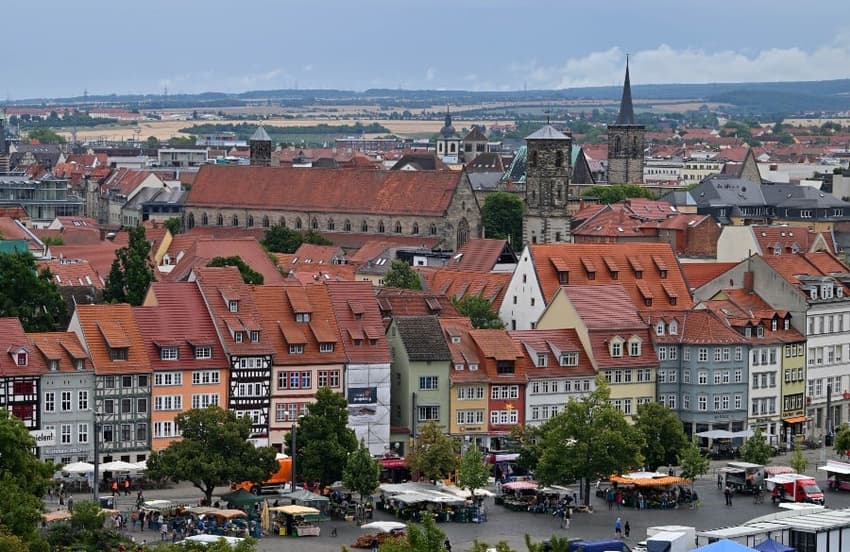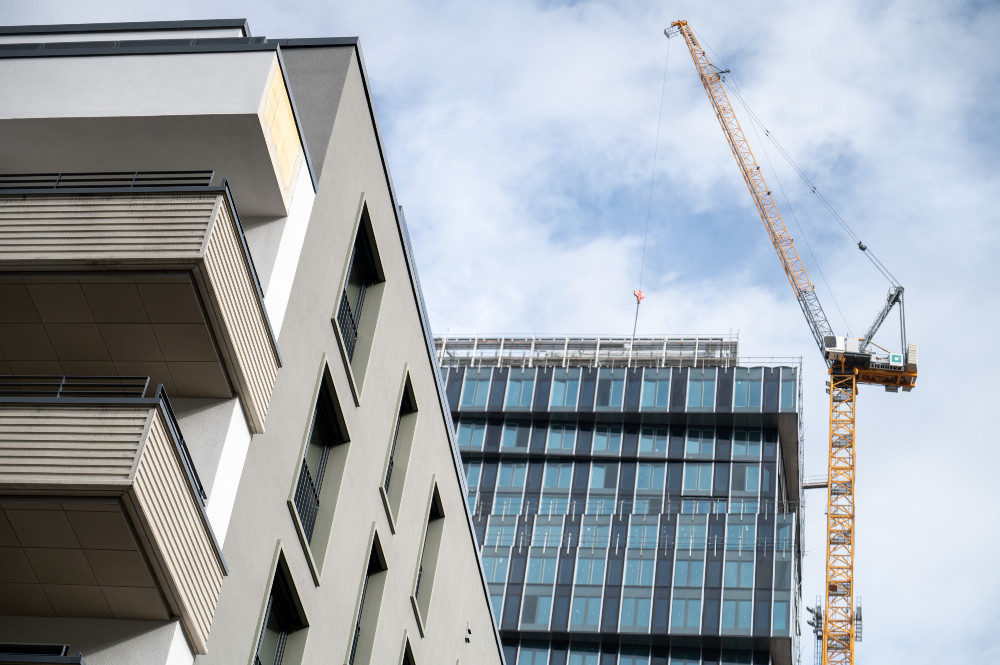Where are property prices in Germany falling the fastest?

According to a new study, residential property prices in Germany continue to plummet. We look at where prices are going down - and in a few places up.
Condominiums - or owner-occupied flats - fell in price by an average of 1.5 percent between July and September compared to the previous quarter, the Kiel Institute for the World Economy (IfW) reported in its analysis published on Thursday.
Compared to the same quarter of the previous year, the decline was even greater at 10.5 percent.
The dramatic fall isn't just affecting flats, however: detached homes in Germany cost an average of 3.2 percent less than in the previous quarter and 12.1 percent less than a year earlier.
Meanwhile, prices for semi-detached homes fell by 5.9 percent compared to the previous quarter - and by as much as 24 per cent compared to the same quarter of the previous year.
READ ALSO: Germany sees record drop in property prices
Where prices are declining the most
The fall in prices for owner-occupied flats compared to last year's highs is particularly marked in some major cities. For example, the price tag for condominiums in Düsseldorf, the capital of North Rhine-Westphalia, fell by more than 17 percent and in Stuttgart by more than 15 percent.
According to the study, the cumulative price declines in Frankfurt, Hamburg and Munich were also more than 10 percent, or the average price decline for all cities surveyed.
Sales prices for apartments in Germany's seven largest cities - Berlin, Düsseldorf, Frankfurt, Hamburg, Cologne, Munich and Stuttgart - fell almost across the board in the third quarter.
"Only in Cologne did they rise slightly by 1.1 percent," the study stated.
The strongest price decline was recorded in Düsseldorf, the capital of North Rhine-Westphalia, at minus 6.6 percent.
In Frankfurt, with a dip of 1.6 percent, and Stuttgart, where they declined by 1.9 percent, prices have recently fallen rather moderately, while in Berlin, where prices fell by 0.8 percent, they have stayed mostly stable.

Apartments being built in Frankfurt in August 2022. Photo: picture alliance/dpa/Deutsche Presse-Agentur GmbH | Sebastian Gollnow
Apartments have also become cheaper outside the seven largest metropolises, although the extent of the price decline varies greatly from region to region.
The strongest dips were observed in Leipzig with minus 4 percent, in Duisburg with minus 4.4 percent and above all in Münster with minus 6.2 percent and in Erfurt with minus 9.1 percent.
Cities in which prices have recently risen quite significantly are Chemnitz with an increase of 5.2 percent and Potsdam, which saw housing get 4.2 percent more expensive in the third quarter.
READ ALSO: 'Get help and don't rush': Your top tips for buying property in Germany
‘Crisis’
The main reason for the trend reversal in the real estate market after several boom years is the increase in interest rates, which have made mortgages significantly more expensive.
Added to this is stubbornly high inflation, which reduces people's purchasing power and means many people can no longer afford to buy property.
"The crisis on the German property market is continuing," said IfW President Moritz Schularick, summarising the results.
"The ECB's interest rate hikes have triggered a clear downward trend reversal on the German housing market, and the bottom is not yet in sight."
The European Central Bank (ECB) has raised its key interest rate to 4.5 percent in order to combat high inflation.
Across all types of housing, around a third fewer sales were registered than in the previous year.
Measured against the average for 2019 to 2021, the figure becomes around 50 percent lower.
"The falling transaction figures indicate that only a few sellers and buyers are coming together at the current prices," commented Institute President Schularick.
"This is bad news, especially with regard to the new construction business - for the economy, but also for Germany as a business location, which urgently needs new living space in the cities in order to be attractive for locally mobile skilled workers."
Comments
See Also
Condominiums - or owner-occupied flats - fell in price by an average of 1.5 percent between July and September compared to the previous quarter, the Kiel Institute for the World Economy (IfW) reported in its analysis published on Thursday.
Compared to the same quarter of the previous year, the decline was even greater at 10.5 percent.
The dramatic fall isn't just affecting flats, however: detached homes in Germany cost an average of 3.2 percent less than in the previous quarter and 12.1 percent less than a year earlier.
Meanwhile, prices for semi-detached homes fell by 5.9 percent compared to the previous quarter - and by as much as 24 per cent compared to the same quarter of the previous year.
READ ALSO: Germany sees record drop in property prices
Where prices are declining the most
The fall in prices for owner-occupied flats compared to last year's highs is particularly marked in some major cities. For example, the price tag for condominiums in Düsseldorf, the capital of North Rhine-Westphalia, fell by more than 17 percent and in Stuttgart by more than 15 percent.
According to the study, the cumulative price declines in Frankfurt, Hamburg and Munich were also more than 10 percent, or the average price decline for all cities surveyed.
Sales prices for apartments in Germany's seven largest cities - Berlin, Düsseldorf, Frankfurt, Hamburg, Cologne, Munich and Stuttgart - fell almost across the board in the third quarter.
"Only in Cologne did they rise slightly by 1.1 percent," the study stated.
The strongest price decline was recorded in Düsseldorf, the capital of North Rhine-Westphalia, at minus 6.6 percent.
In Frankfurt, with a dip of 1.6 percent, and Stuttgart, where they declined by 1.9 percent, prices have recently fallen rather moderately, while in Berlin, where prices fell by 0.8 percent, they have stayed mostly stable.

Apartments have also become cheaper outside the seven largest metropolises, although the extent of the price decline varies greatly from region to region.
The strongest dips were observed in Leipzig with minus 4 percent, in Duisburg with minus 4.4 percent and above all in Münster with minus 6.2 percent and in Erfurt with minus 9.1 percent.
Cities in which prices have recently risen quite significantly are Chemnitz with an increase of 5.2 percent and Potsdam, which saw housing get 4.2 percent more expensive in the third quarter.
READ ALSO: 'Get help and don't rush': Your top tips for buying property in Germany
‘Crisis’
The main reason for the trend reversal in the real estate market after several boom years is the increase in interest rates, which have made mortgages significantly more expensive.
Added to this is stubbornly high inflation, which reduces people's purchasing power and means many people can no longer afford to buy property.
"The crisis on the German property market is continuing," said IfW President Moritz Schularick, summarising the results.
"The ECB's interest rate hikes have triggered a clear downward trend reversal on the German housing market, and the bottom is not yet in sight."
The European Central Bank (ECB) has raised its key interest rate to 4.5 percent in order to combat high inflation.
Across all types of housing, around a third fewer sales were registered than in the previous year.
Measured against the average for 2019 to 2021, the figure becomes around 50 percent lower.
"The falling transaction figures indicate that only a few sellers and buyers are coming together at the current prices," commented Institute President Schularick.
"This is bad news, especially with regard to the new construction business - for the economy, but also for Germany as a business location, which urgently needs new living space in the cities in order to be attractive for locally mobile skilled workers."
Join the conversation in our comments section below. Share your own views and experience and if you have a question or suggestion for our journalists then email us at [email protected].
Please keep comments civil, constructive and on topic – and make sure to read our terms of use before getting involved.
Please log in here to leave a comment.